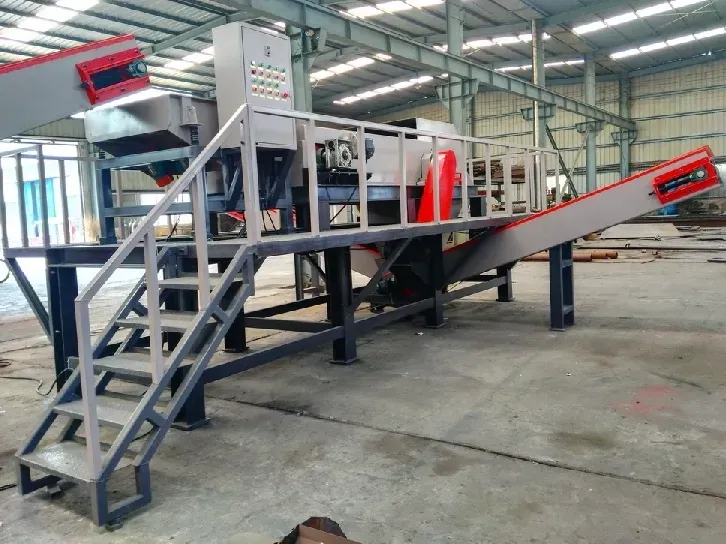

نوامبر . 08, 2024 00:02 Back to list
How to Dispose of Broken Electronics Responsibly
In our fast-paced, technology-driven society, electronic devices have become an integral part of our daily lives. From smartphones to laptops, these gadgets help us stay connected, work efficiently, and enjoy entertainment. However, with the rapid advancement of technology, electronics can quickly become outdated or, worse, broken. When we find ourselves with a non-functioning gadget, the question arises how do we dispose of broken electronics responsibly? Proper disposal is essential not only for environmental health but also for our community’s well-being, and it involves several key steps.
1. Understand the Risks of Improper Disposal
Improper disposal of electronics can have severe environmental implications. Many electronic devices contain hazardous materials such as lead, mercury, and cadmium, which can leach into the soil and water supply if tossed into a landfill. These substances pose risks not only to the environment but also to human health. It's vital to be aware that simply throwing these devices in the trash contributes to pollution and takes up valuable landfill space, reinforcing the need for responsible disposal methods.
2. Explore Manufacturer Take-Back Programs
Many electronics manufacturers and retailers have implemented take-back programs to encourage responsible recycling. Companies such as Apple, Best Buy, and Dell offer options for consumers to return their broken or outdated devices. These programs often allow you to send your device back through the mail or drop it off at a designated location. By taking advantage of these initiatives, you ensure that the electronic waste is disposed of correctly and that valuable materials are recycled rather than discarded.
3. Utilize Local E-Waste Recycling Centers
Numerous communities offer dedicated e-waste recycling centers where individuals can drop off their broken electronics for safe disposal. Many local governments have established facilities specifically designed to handle electronic waste. These centers are equipped to break down devices and recycle materials safely. To find a nearby e-waste recycling center, visit your local government's website or consult environmental agencies. Often, these centers may provide scheduled events for electronics collection, making it easier for residents to participate.

4. Consider Donation or Resale
If your broken electronics have the potential for repair or can still function in a limited capacity, consider donating them to organizations or individuals who may benefit from them. Charities, schools, or community centers may accept unusable electronics, particularly if they can be repaired or repurposed. Additionally, some organizations specialize in refurbishing old electronics to redistribute them to families in need. Selling broken electronics online can also be a viable option, especially on platforms dedicated to used or damaged goods. Some companies buy broken devices for parts and recycling endeavors, offering you a small return for your unwanted gadget.
5. Erase Personal Data
Before disposing of any electronic device, it’s crucial to safeguard your personal information. Many devices, such as smartphones and laptops, contain sensitive data that can be compromised if they fall into the wrong hands. To protect your privacy, perform a factory reset and ensure that all personal information is deleted. Additionally, remove any SIM cards or memory cards that contain personal data before recycling or disposing of the device.
6. Educate Others and Advocate for Change
Raising awareness about the importance of responsible electronic disposal in your community can amplify efforts to promote sustainable practices. Share knowledge with friends and family, and advocate for e-waste recycling programs in local schools and organizations. Engaging in discussions about electronic waste can lead to collaborative efforts that encourage more people to participate in proper disposal methods.
Conclusion
Disposing of broken electronics is a responsibility we all share. By understanding the risks of improper disposal, leveraging manufacturer programs, utilizing local recycling centers, considering donation or resale, safeguarding personal data, and advocating for change, we can contribute to a cleaner, healthier environment. Taking these steps not only benefits our planet but ensures that we are acting as conscientious stewards of technology in our communities. As technology continues to evolve, let us commit to responsible ownership and disposal practices that reflect our values for sustainability and stewardship.
Latest news
Troubleshooting Common Eddy Separator Problems
NewsJul.04,2025
The Role of Metal Recycling Plants in Circular Economy
NewsJul.04,2025
The Impact of Recycling Line Pickers on Waste Management Costs
NewsJul.04,2025
Safety Features Every Metal Shredder Should Have
NewsJul.04,2025
How Industrial Shredders Improve Waste Management Systems
NewsJul.04,2025
How Cable Granulators Contribute to Sustainable Recycling
NewsJul.04,2025